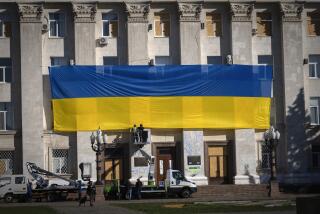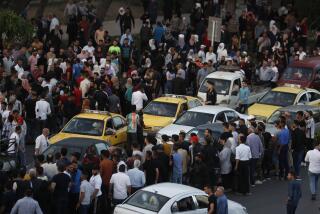Kurdish autonomy in Syria troubling for rebels, Turkey
AFRIN, Syria âThis tranquil town in northwest Syria is a haven from the warfare convulsing much of the country, but the calm points to profound challenges facing the country â and the entire region â when the fighting ends.
The laid-back guards at the checkpoints are Kurdish militiamen. The mustachioed man whose image greets visitors is Abdullah Ocalan, who is serving a life sentence in a Turkish prison for his leadership role in the Kurdistan Workers Party, or PKK, a group deemed a terrorist organization by Turkey, the United States and the European Union.
Here, the PKK is widely lauded as the vanguard of Kurdish nationalism, a movement that has unsettled countries in the area for decades. In recent months, the de facto âliberationâ of Syrian Kurdish communities like Afrin has ranked among the most unanticipated and broadly significant outcomes of the Syrian rebellion.
Newly established Kurdish control here presents a quandary for Syriaâs Sunni Arab-led rebel movement, which has a tense relationship with the Kurds, and for whatever government emerges should Syrian President Bashar Assad fall. It also has troubled Turkey, which this week fired artillery into Syria after apparently errant cross-border shelling killed Turkish villagers. Turkey, a regional power and NATO member, appears to have few good options.
The cross-border shelling illustrated how Turkeyâs relationship with Assad, who had kept Syriaâs Kurds in check, has crumbled. But Assadâs weakness and possible fall from power present Turkey with an even more dismaying prospect: a swath of northern Syria firmly under control of the PKK.
Turkey has waged a long and bloody war against the Kurdish group on its own territory, and has suffered a recent surge in PKK attacks. Prime Minister Recep Tayyip Erdogan has threatened to attack Kurdish areas of Syria if they become a haven for the PKK, one-third of whose fighters, according to a recent study, are of Syrian origin.
For now, conflict seems far away from Kurdish towns like this agricultural hub, known for its olives and pomegranates and dotted with craggy hills featuring the toppled remnants of Roman temples, early Christian basilicas and medieval citadels.
While battles rage in Aleppo, just 40 miles to the southeast, markets here are lively and, in the evenings, men at animated eateries sip arak, the clear, anise-flavored liquor that turns cloudy when mixed with ice and water.
Assadâs stretched forces gradually withdrew, culminating in a near-total pullout in July that occurred with barely a shot being fired, Kurdish leaders say.
âWe didnât suffer a drop of blood,â boasts Atouf Abdo, a coordinator here with the Democratic Union Party, or PYD, a close ally of the PKK and the dominant Kurdish faction here.
Nearby, rebel-held Arab cities like Azzaz and Al Bab have become doleful and depopulated battlegrounds, rubble-strewn ghost towns where remaining residents dart for cover when fighter jets buzz overhead. But the main evidence here of the war raging nearby are thousands of Arab refugees, most of them women and children. Kurdish leaders say that noncombatants have been welcomed, but that they have kept out armed rebels.
Kurdish aspirations for more autonomy, or outright independence, have long perturbed Turkey, Syria, Iraq and Iran.
Officially, Syria has more than 2 million Kurds, about 10% of the national population. Kurdish activists claim the real number approaches 20%.
At least 4,000 Syrian Kurds have been killed while fighting for the PKK, according to Kurdish activists here.
Many Turkish officials view the PYD as nothing more than a front for their archenemy, the PKK. Some Turkish officials call the Syrian governmentâs withdrawal a deliberate strategy by Assad to embolden PKK sympathizers here to strike back at Turkey to retaliate for Ankaraâs support of the rebellion. Kurdish leaders here reject suggestions that they collaborated with Assad.
Kurdish representatives said they seek a measure of self-rule within Syria, not independence. The dispersed nature of Syriaâs Kurds â the densest population lives nearly 300 miles east of Afrin â makes a separate Kurdish Syrian state unlikely. One aim of Kurdish leadership is to begin formal Kurdish-language instruction in schools.
âWeâre looking for a democratic, pluralistic state and to isolate the state from religion,â said Mustafa Hussein, an activist here with the Kurdish National Council, an umbrella group.
Mutual mistrust characterizes relations between the Kurds and Syriaâs Sunni Arab majority. Kurds say they also have faced discrimination during much of the 40-plus-year reign of the Assad family, who are members of the Alawite minority, an offshoot of Shiite Islam.
Once Syriaâs rebellion erupted in March 2011, Assadâs administration generally sought to placate the Kurds, part of a broader effort to present the government as a defender of minorities. Still, many Kurds blamed the government for the assassination last year of a celebrated Kurdish pro-democracy activist, Mashaal Tammo.
Kurdish officials say they sympathize with efforts to overthrow Assad. But wariness abounds about Arab nationalism in general, and what many here view as the increasingly Islamist face of the Syrian rebellion. Kurds, like most Syrians, are predominantly Sunni Muslims, but Kurdish activists here say their region has a strong secular tradition.
âAs the revolution has continued over a long period, it has opened the door to more extreme ideology,â said Hussein of the Kurdish National Council.
Many Kurds see the rebel Free Syrian Army and its supporters in the Muslim Brotherhood, the pan-Arab political movement, as hostile to their aspirations.
Checkpoints manned by Kurdish militiamen line the roads and deny access to rebel forces. Kurdish âself defenseâ units have been receiving basic military training in Iraqâs quasi-autonomous Kurdistan.
PYD forces provide police and other services and appear in control of the infrastructure, somewhat to the chagrin to other Kurdish groups. The PYD, the most militarized Kurdish faction, has faced charges of using strong-arm tactics to put down rival Kurdish factions, allegations it generally denies.
Asked about the rebel fight to oust Assad, Mohammad Jarnas, 42, a teacher here affiliated with the PYD, responded, âTheir struggle is a legitimate one, but it is a bit chaotic. It is not our fight now.â
Kurdish leaders view Assadâs fall as a matter of time, and they are preparing for what they view as an inevitable violent scramble for power among various Sunni Arab factions, all hostile to Kurdish self-governing aspirations.
âWe will not hesitate to defend the rights of the Kurdish people,â says Abdo, the PYD coordinator here. âThe arming of the Kurdish people is a fact, in every Kurdish village. We will defend ourselves.â
More to Read
Sign up for Essential California
The most important California stories and recommendations in your inbox every morning.
You may occasionally receive promotional content from the Los Angeles Times.










